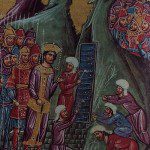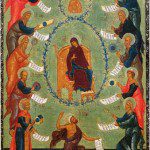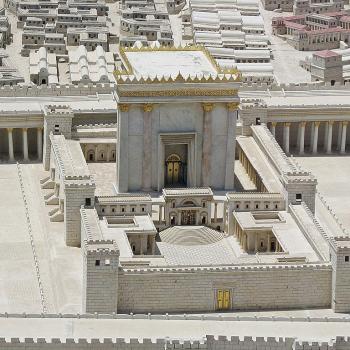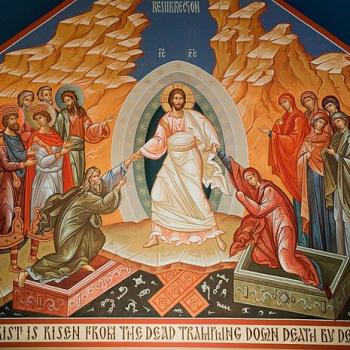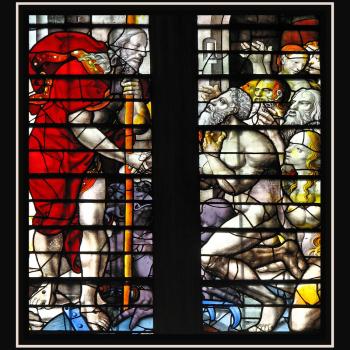In the time before the incarnation, humanity was, as it were, stumbling around in the darkness of the night, with our sin covering up the light of truth. We had gone astray and closed ourselves off from God. “So it was we who strayed from the way of truth, and the light of righteousness did not shine on us, and the sun did not rise upon us“ (Wis. 5:6 RSV). There were, to be sure, various holy men and women throughout the world, shining like stars in the night sky, showing us that the power of sin was limited: it could not, would not snuff out the light. Sin could not entirely deface the image of God in humanity – it could not obliterate the goodness of God’s creation. There were guides throughout human history who were touched by the glory of God and their righteousness shone bright, giving humanity vision in the darkness, so that though we might stumble in the twilight of sin, we could still journey onward towards the truth.
![Ceiling Mosaic - Christus helios, the mosaic of Sol in Mausoleum M, which is interpreted as Christ-Sol (Christ as the Sun). Detail of vault mosaic in the Mausoleum of the Julii. From the necropolis under St. Peter's Mid-3rd century Grotte Vaticane, Rome By User:Leinad-Z ([1]) [Public domain], via Wikimedia Commons](https://wp-media.patheos.com/blogs/sites/637/2016/08/ChristAsSol-281x300.jpg)
Ceiling Mosaic – Christus helios, the mosaic of Sol in Mausoleum M, which is interpreted as Christ-Sol (Christ as the Sun). Detail of vault mosaic in the Mausoleum of the Julii. From the necropolis under St. Peter’s Mid-3rd century Grotte Vaticane, Rome
By User:Leinad-Z ([1]) [Public domain], via Wikimedia Commons
For behold, the day comes, burning like an oven, when all the arrogant and all evildoers will be stubble; the day that comes shall burn them up, says the LORD of hosts, so that it will leave them neither root nor branch. But for you who fear my name the sun of righteousness shall rise, with healing in its wings. You shall go forth leaping like calves from the stall (Mal. 4:1-2 RSV).
The light of God, the consuming fire, shall reveal all things which had been hidden in the darkness, and all deeds will be judged. “For there is nothing hid, except to be made manifest; nor is anything secret, except to come to light” (Mk. 4:22 RSV). Those who remain attached to the way of darkness and sin will find themselves consumed by the fire of God, but those who give themselves over to God will merge with the light and find their strength restored because of the light. “For it is the God who said, ‘Let light shine out of darkness,’ who has shone in our hearts to give the light of the knowledge of the glory of God in the face of Christ” (2 Cor. 4:6 RSV).
Christ, then, is the sun of righteousness; he who is the light of the world has come into the world ending the night of sin and bringing with him the dawn of a new day. “I am the light of the world; he who follows me will not walk in darkness, but will have the light of life” (Jn. 8:12b). Zechariah realized this and, serving as one of the last of the prophets of the Old Covenant, declared that John the Baptist would prepare the way, making Israel and the world ready for God’s new dawn:
And you, child, will be called the prophet of the Most High; for you will go before the Lord to prepare his ways, to give knowledge of salvation to his people in the forgiveness of their sins, through the tender mercy of our God, when the day shall dawn upon us from on high to give light to those who sit in darkness and in the shadow of death, to guide our feet into the way of peace (Lk. 1:75-79 RV).
This theme was taken in and employed by the great Latin Patristic poet, Prudentius, who wrote two hymns specifically on this theme – “A Hymn for the Cock-Crow” and “A Morning Hymn.” The first is about the preparation for our work with Christ:
The winged messenger of day
Sings loud, foretelling dawn’s approach,
And Christ in stirring accent calls
Our slumbering souls to life with Him.‘Away,’ He cries, ‘with dull repose,
The sleep of death and sinful sloth;
With hearts not sober, just and pure,
Keep watch, for I am very near.’[1]
This hymn is full of imagery relating to the darkness of sin and its relationship with the night, but Prudentius did so employing what is found in the Gospels to make his message clear. Thus, why did Peter deny Christ three times before the cock-crow? Because it was in the dead of night, when such evil occurs:
For evil deeds are ever done
Before the herald of the dawn
Enlightens human kind and brings
And end to error and sin. [2]
And Christ himself came back to life at the dawn, with the cock once again crowing, showing forth the new creation coming with the new light of Christ:
Hence all now hold in firm belief
That in the stillness of the night
When loudly crows the joyful cock
Our Lord came back from Hell’s dime shore.The strength of death was then subdued;
Then Hell’s dominion lost its sway;
Then day with night more potent far
Compelled the shades of night to flee.[3]
In the end, therefore, the world and its vanity is to be expelled by the light of Christ. We who had once stumbled about in the darkness of sin, seeking to satisfy our inordinate passions, now should awaken with the crowing at the dawn of eternity, awake and sin no more. What we once sought after is but illusion, and any value we find in them will vanish when exposed to the light of truth.[4]
This theme continued in his “A Morning Hymn,” where Prudentius contrasted the ways of sin, which continue to embrace the ways of darkness, seeking its vainglory and false riches, with those who abandon it all to embrace the light and receive the true glory of Christ with the riches that Christ provides those who love him. He connected his own life into the equation, seeing what he had given up for Christ, comparing it to those who remain in the world following its pursuits. He left it all to follow Christ into the light of day so that he can receive true riches while others remain in the world, seeking selfishly for themselves that which does not last:
All set about the tasks they love
When morning’s golden hour arrives:
The soldier, townsman, mariner,
The craftsman, merchant, husbandman.One seeks the glory of the courts;
Another heeds war’s trumpet call;
The tradesman and countryman
Are eager for their sordid gains.But, we, O Christ, who know not wealth,
Nor usury, nor eloquence,
Nor daring in the art of war,
Have learned to love but Thee alone.[5]
While abandoning many ways which people seek to pursue the empty riches of the world, Prudentius pointed out he came to understand its vanity and so sought the accumulation of spiritual riches which will not fade:
In this blest service we are rich;
By commerce such as we live,
And from the rising of the sun
These exercises fill the hours.[6]
It is interesting to see the contrasts which Prudentius made—all the paths to worldly success, be it ambition in war or in trade of some kind, are all contained within the darkness of sin. Their gains are seen to be obtained through immoral means. Worldly glory follows the paths established in the darkness of sin, while Christ reveals how it is all to be cast aside; those who follow Christ will know not the ways of the world and so will often look to be unsuccessful while they obtain true riches and glory and those who follow the world will find all they have gain vanishes as its illusion is dissipated in the judgment of Christ. True riches is not found in material wealth, and so true commerce is not had in the trade of material goods – they are all found in Christ, and those who seek them in Christ through proper spiritual exercises will find they have gained much in the rising of the sun of righteousness.
We must, he suggested, cast aside all the ways of the world established in the night of sin. Though they might seem to bring us material success, they do not bring us true riches, true glory, as the righteous light of Christ judges all things. Just as many hide themselves in the darkness of the night so that they can perform all kinds of misdeeds, so those before Christ, in the spiritual darkness, tried to hide themselves from God. But now that Christ has come, all things are revealed in his light. This, however, can be for our good – because now we can see what we are doing in the light of truth and so act accordingly. The darkness now must make way for the light –it can no longer deceive those who are in the light and cause them to stumble:
Let darkness now at length recede,
In which too long our wandering steps
Have led us stumbling on the path
Of error and iniquity.[7]
Prudentius took the prophetic sign of Christ as the Sun of Righteousness (Mal. 4:2) as indicative of the new state of existence which has emerged because of the incarnation. Each day and night serves to reflect salvation history – the night representative of the darkness of sin as it covered the earth, while the dawn represents the coming of Christ, the incarnation which brings the light so that it can shine in the darkness showing that the darkness has no power over the light.
While the hymn is rich with themes coming directly from Scripture, and used by many Patristic sources before him, Prudentius has a way of bringing them together so that we can now reflect upon their relationship in ourselves and our reaction to Christ’s spiritual dawn. Are we now going to continue in the old ways, and try to scurry off in the darkness of sin, hoping to hide ourselves from the ever-increasing light of Christ, or will we move beyond our old ways and the passions which drag us back into the darkness, judge ourselves and our attitudes as unworthy of our service to Christ, and truly follow him with all we have, unconcerned with all the vainglorious activity which motivated us while we were encased in the darkness of sin?
We can pursue the darkness of worldly affairs, ignoring the light of Christ – we can seek our fame and fortune in the world, but what a fleeting pursuit such things are since they do not last. We should instead follow the light of Christ, the Sun of Righteousness, seek after him and follow him like moths to a flame. The light should be our focus, indeed, if only we were to go all the way to Christ, to the light itself, and unite with him – we would see all things in his light and understand even more how shallow worldly pursuits can be. We are to fill our life with our pursuit of Christ if we want to find the true, eternal riches which he offers – not the shadow of it which is constantly being followed by human greed. Avarice with its usury will make everyone poor just as much as an eye for an eye will make everyone blind – but being enflamed by Christ will bring us in union with his flame of love and make us truly rich.
But how often do we turn our backs and return to the little darkness which is left? How many seek power through means of war? How many seek wealth through unjust means? How often do we offer defense for the darkness by saying it is the way things are? In the darkness all things blend together and so it is easy to confuse justice with injustice and use the darkness to bring material support to injustice. But in the light of Christ, we must give it all up. We must give up all pretense that the ways of darkness have validity. If we but follow Christ, we can no longer stand back and justify sin as “the way things are.” Sin is not natural, and it only is allowed to thrive in the shadows which we make for it. If some poor are oppressed by the rich seeking more wealth – we can’t just say it is the way economics works and justify the oppression. We must put the light of Christ to it and show the sin for what it is – what we gain is nothing, and will perish as the light comes upon it, for the darkness cannot contain the light. The same is to be said for other vain forms of glory. We seek them out, but then it vanishes as they come into the light, and then what do we have left?
We must follow the light, we must seek it, let the dawn rise up and eliminate all the shadows of sin in our way of life; we must merge with the light, become one with it – if we want true glory:
This is the message we have heard from him and proclaim to you, that God is light and in him is no darkness at all. If we say we have fellowship with him while we walk in darkness, we lie and do not live according to the truth; but if we walk in the light, as he is in the light, we have fellowship with one another, and the blood of Jesus his Son cleanses us from all sin (1 Jn. 1:5-7 RSV).
Prudentius had come to understand this by the time he wrote his poetry. He himself, it appears, once pursued worldly glory and attained some level of political authority. It did not satisfy. He gave it up – probably to become a monk in his older age. He saw how in the world he might have been great but he also saw in the dawn of Christ’s light what he was attaining was in reality nothing. It would all vanish. It was all meaningless.The darkness of the world will entirely be put to the light as time itself comes to an end and eternity begins. is to give way to eternity. The darkness will perish and the light will last forever. We should follow the example of Prudentius and accept what the light of truth shows to us instead of trying to use the darkness as a cover for our sins. For no matter what the darkness tries to claim for itself, it cannot overcome the light: “The light shines in the darkness, and the darkness has not overcome it” (Jn. 1:5 RSV).
[1] Prudentius, “A Hymn for Cock-Crow” in The Poems of Prudentius. trans. Sister M. Clement Eagan, C.C.V.I. (Washington, DC: Catholic University of America Press,1962), 3.
[2] Ibid., 6.
[3] Ibid., 6-7.
[4] See ibid., 7-8.
[5] Prudentius, “A Morning Hymn” in The Poems of Prudentius. trans. Sister M. Clement Eagan, C.C.V.I. (Washington, DC: Catholic University of America Press,1962), 10-11.
[6] Ibid., 11.
[7] Ibid., 13.
Stay in touch! Like A Little Bit of Nothing on Facebook:
A Little Bit of Nothing


